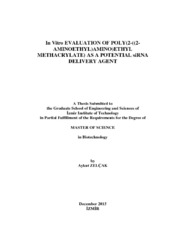Please use this identifier to cite or link to this item:
https://hdl.handle.net/11147/4576Full metadata record
| DC Field | Value | Language |
|---|---|---|
| dc.contributor.advisor | Bulmuş Zareie, Esma Volga | - |
| dc.contributor.advisor | Seyrantepe, Volkan | - |
| dc.contributor.author | Zelçak, Aykut | - |
| dc.date.accessioned | 2016-04-29T06:57:10Z | - |
| dc.date.available | 2016-04-29T06:57:10Z | - |
| dc.date.issued | 2015-12 | - |
| dc.identifier.citation | Zelçak, A. (2015). In vitro evaluation of poly (2-((2-aminoethyl) Amino) ethyl methacrylate) as a potential siRNA delivery agent. Unpublished master's thesis, İzmir Institute of Technology, İzmir, Turkey | en_US |
| dc.identifier.uri | http://hdl.handle.net/11147/4576 | - |
| dc.description | Thesis (Master)--Izmir Institute of Technology, Biotechnology, Izmir, 2015 | en_US |
| dc.description | Full text release delayed at author's request until 2019.01.25 | en_US |
| dc.description | Includes bibliographical references (leaves: 57-68) | en_US |
| dc.description | Text in English; Abstract: Turkish and English | en_US |
| dc.description | x, 68 leaves | en_US |
| dc.description.abstract | The aim of this thesis is to investigate poly(2-((2-aminoethyl)amino)ethyl methacrylate) (P(AEAEMA)) as a potential siRNA carrier. For this purpose, an amine containing monomer 2-((tert-butoxycarbonyl) (2-((tert-butoxy carbonyl) amino) ethyl) amino) ethyl methacrylate (BocAEAEMA) was synthesized. Reversible addition-fragmentation chain transfer (RAFT) polymerization was performed to prepare homo- and block co-polymers of BocAEAEMA. The synthesized polymers -P(AEAEMA)19, P(AEAEMA)41 and P(PEGMA)12-b-P(AEAEMA)32- were characterized via NMR and GPC. The cytotoxicity of the polymers was investigated in vitro using ovarian cancer cell line (Skov-3-luc) via MTT assay. The polymers did not show any toxic effect on cells in 24 h. The ability of the BocAEAEMA polymers to form polyplexes with siRNA was investigated via gel electrophoresis. P(AEAEMA)19, P(AEAEMA)41 and P(PEGMA)12-b-P(AEAEMA)32 could efficiently form complexes with siRNA at an N/P ratio of 5, 2, and 2 respectively. Gel electrophoresis analysis revealed that P(AEAEMA)41 and P(PEGMA)12-b-P(AEAEMA)32 could protect siRNA against serum components at least for 6 h. Block copolymer, when complexed with siRNA at an N/P ratio of 10, could protect siRNA longer (24 h) when compared with the homopolymer. The size and surface charge of the polyplexes were investigated by DLS. The diameter of the P(AEAEMA)41-siRNA complexes was found to be lower than 110 nm at all N/P ratios tested. In contrast, P(PEGMA)12-b-P(AEAEMA)32-siRNA complexes (except the complex prepared at the N/P ratio of 2), displayed aggregation tendency. All polyplexes displayed positive zeta potential. The zeta potential of the homopolymer was found to be higher than the copolymer at the N/P ratio of 2. Finally, in order to determine siRNA transfection ability of the polymers, luciferase assay was optimized using a commercial transfection reagent lipofectamine RNAimax. The optimized assay conditions will be used in future studies to determine the transfection efficiency of the polymers. | en_US |
| dc.description.abstract | Bu tezin amacı poli(2-((2-aminoethil)amino)ethil metakrilat) (P(AEAEMA)) ‘ın siRNA taşıma potansiyelinin belirlenmesidir. Bu amaçla, amin içeren monomer 2-((tert-butoksikarbonil) (2-((tert-butoksikarbonil) amino) etil) amino) etil metakrilat (BocAEAEMA) sentezlendi. Daha sonra tersinir katılma ayrışma zincir transfer (RAFT) polimerizasyonu ile BocAEAEMA’nın homo ve blok kopolimer yapıları hazırlandı. Elde edilen polimerler P(AEAEMA)19, P(AEAEMA)41 ve P(PEGMA)12-b-P(AEAEMA)32- GPC ve NMR ile karakterize edildi. Polimerlerin sitotoksik etkileri Skov-3-luc yumurtalık kanseri hücre hattı kullanılarak MTT deneyi ile araştırıldı. MTT sonuçları polimerlerin 24 saat boyunca hücrelere toksik etkisinin olmadığını gösterdi. Polimerlerin siRNA ile kompleks oluşturabilme yetenekleri jel elektroforezi ile araştırıldı. P(AEAEMA)19, P(AEAEMA)41 ve P(PEGMA)12-b-P(AEAEMA)32’ın siRNA ile sırasıyla 5, 2 ve 2 N/P oranlarında etkin kompleksler oluşturabildiği anlaşıldı. Jel elektroforezi analizleri P(AEAEMA)41 ve P(PEGMA)12-b-P(AEAEMA)32’ın siRNA’yı en az 6 saate kadar serum bileşenlerinden koruyabildiğini gösterdi. Blok kopolimerin homopolimere kıyasla siRNA’yı daha uzun sürelerde (24 saat) koruyabildiği tespit edildi. Poliplekslerin boyutu ve yüzey yükleri DLS ile araştırıldı. Denenen bütün N/P oranlarında P(AEAEMA)41-siRNA komplekslerinin 110 nm den küçük olduğu belirlendi. Buna karşın P(PEGMA)12-b-P(AEAEMA)32-siRNA kompleksleri (N/P oranı 2 olan kompleks hariç) agregasyon eğilimi gösterdi. Bütün poliplekslerin pozitif zeta potansiyele sahip olduğu tespit edildi. Son olarak, polimerlerin siRNA’yı transfekte etme yeteneklerini belirleyebilmek için Lusiferaz Deneyi ticari bir transfeksiyon ajanı -lipofectamine RNAimax- kullanılarak optimize edildi. Bu deneylerden elde edilen bulgular, gelecek çalışmalarda polimerlerin transfeksiyon yeteneklerini belirlemek için kullanılmak üzere kaydedildi. | en_US |
| dc.language.iso | en | en_US |
| dc.publisher | Izmir Institute of Technology | en_US |
| dc.rights | info:eu-repo/semantics/openAccess | en_US |
| dc.subject | siRNA delivery | en_US |
| dc.subject | Small interfering RNA | en_US |
| dc.subject | Gene silencing | en_US |
| dc.title | In Vitro Evaluation of Poly (2-((2 Amino) Ethyl Methacrylate) as a Potential Sirna Delivery Agent | en_US |
| dc.title.alternative | Potansiyel Bir Sirna Taşıyıcı Ajan Olarak Poli(2-((2-aminoetil)amino)etil Metakrilat)'ın İn Vitro Değerlendirilmesi | en_US |
| dc.type | Master Thesis | en_US |
| dc.authorid | TR226832 | - |
| dc.institutionauthor | Zelçak, Aykut | - |
| dc.department | Thesis (Master)--İzmir Institute of Technology, Bioengineering | en_US |
| dc.relation.publicationcategory | Tez | en_US |
| dc.identifier.wosquality | N/A | - |
| dc.identifier.scopusquality | N/A | - |
| item.openairecristype | http://purl.org/coar/resource_type/c_18cf | - |
| item.cerifentitytype | Publications | - |
| item.languageiso639-1 | en | - |
| item.grantfulltext | open | - |
| item.fulltext | With Fulltext | - |
| item.openairetype | Master Thesis | - |
| Appears in Collections: | Master Degree / Yüksek Lisans Tezleri | |
Files in This Item:
| File | Description | Size | Format | |
|---|---|---|---|---|
| T001439.pdf | MasterThesis | 2.11 MB | Adobe PDF |  View/Open |
CORE Recommender
Page view(s)
276
checked on Apr 21, 2025
Download(s)
122
checked on Apr 21, 2025
Google ScholarTM
Check
Items in GCRIS Repository are protected by copyright, with all rights reserved, unless otherwise indicated.